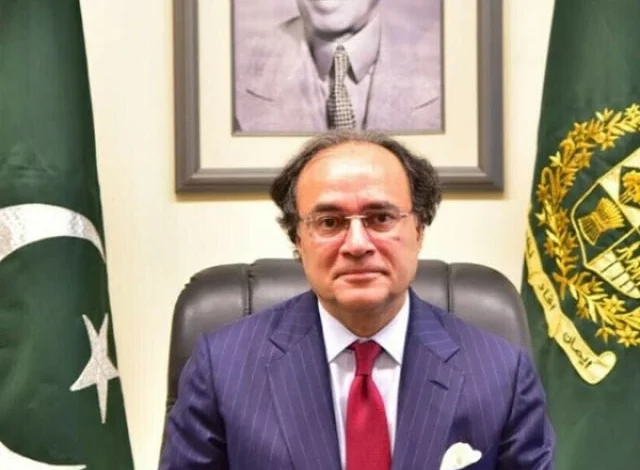FinMin will authorise budgetary honoraria.

According to an official statement, a cabinet body approved a new honorarium policy for civil servants on Monday, granting the finance minister the authority to authorise as many budget honoraria for the staff of the prime minister’s office, parliament, and economic ministries as needed.
The cabinet’s Economic Coordination Committee (ECC), led by Finance Minister Muhammad Aurangzeb, “approved a summary by the Finance Division, outlining the policy for the grant of honorariums to the government employees,” according to the statement.
The newly approved policy allowed the finance minister to “grant budget honorarium to the employees posted in Finance Division, Revenue Division, Federal Board of Revenue (FBR), Planning, Development and Special Initiatives Division, National Assembly Secretariat, Senate Secretariat and the Prime Minister’s Office,” as authorised by the ECC.
The new policy states, “The quantum of budget honorarium for each financial year shall be decided by the Finance Minister,” granting the minister the freedom to award as many budget honoraria as they see appropriate, with no upper limit.
Additionally, these budget honoraria will have a tax rate that is far lower than the regular income tax rates. The policy states that “taxation of honorarium will be on the lines of taxation of monetization allowance,” subject to approval by the federal cabinet. Only five percent of the money that bureaucrats receive in monetization allowance is taxed as income.
“The tax on payments under the Compulsory Monetisation of Transport Facility for Civil Servants in BS-20 to BS-22 (as reduced by deduction of driver’s salary) shall be charged at the rate of 5% as a separate block of income” , according to the income tax law.
Finance Minister Muhammad Aurangzeb stated that “the grant of budget honorarium has always been with finance minister as chair of the ECC” in response to questions from The Express Tribune.
He went on to say that because his job required tight collaboration with all economic ministries involved in budget creation and execution, the finance minister was in the greatest position to assess efforts in the budget-making process.
“Secondly the supposed discretionary power is exercised on the recommendations of Honorarium committees and PAOs and is further subjected to a delegated evaluation within each ministry’s constituent units,” stated the minister.
The finance minister responded that the “budget honorarium is one time reward regime and therefore taxed at a different rate than salary” in response to another query concerning the tax rate on these honoraria.
All things considered, the new regulation simplifies the benefits that bureaucrats receive in addition to their regular wages. In a fiscal year, the federal secretaries are currently permitted to award one honorarium to grade 18 officials.
The ECC chairman’s consent was necessary for grades higher than 18. The new regulation will allow the federal secretary to pay one honorarium to each employee, with the exception of themselves.
Additionally, a new incentive category for all federal employees is revealed. The absence of a compensation system for top performers in the federal government at the moment, according to the Finance Ministry, demotivates outstanding workers.
It has now been determined that, in cases of exceptional performance, the federal secretary may award one performance honorarium equivalent to one basic pay to no more than 25% of a ministry’s or division’s employees in BPS 1-22, excluding the individual. The decision states that the federal minister will determine the federal secretary’s honorarium.
The new policy states that no other honoraria, including those related to religious holidays like Eid and Christmas, will be given out, with the exception of one annual award, one performance reward, and as many budget rewards as the finance minister desires. Ordinary and performance honoraria shall not be awarded to employees who have already received budget honoraria.
According to the new regulation, all honoraria must be shown on payroll statements and no honoraria will be paid in cash. If an employee has not worked for a ministry for less than six months, the ministry will not provide them a performance honorarium.
In any fiscal year, no honoraria will be given prior to May 1st, with the exception of honoraria for exceptional achievement. Ordinary and performance honoraria shall not be awarded to employees who have already received budget honoraria.
The amount of budget honoraria shall be deducted from the amount of performance honoraria already paid to an employee who has already received ordinary and performance honoraria. No worker will be compensated by more than one organisation.
In the meantime, the ECC authorised further funds totalling Rs61.2 billion for a number of ministries, primarily to settle short-term debt. According to the Finance Ministry, it authorised Rs1.7 billion for the Ministry of Defence “for technological upgradation of the ISPR”.
A grant of Rs1.3 billion was authorised at the meeting, and the Finance Ministry would return the money to the Sindh government as unused funds from the wheat seed cash reimbursement programme. Based on updated budget estimates for FY2024–2025, it authorised Rs40.3 billion for the Economic Affairs Division to repay short-term foreign loan credits.
The Power Division’s summary for approval of a tripartite power purchase agreement for the 1,145 MW Karachi Nuclear Plant Units-2 (K-2) and-3 (K-3) was also authorised by the ECC.
After reviewing the Commerce Ministry’s brief, the ECC authorised a change to the import policy order (IPO) pertaining to state-owned defence production companies and their fully-owned commercial subsidiaries. The Housing Ministry submitted a report to the ECC requesting that the orders for the transfer of the Hyderabad and Karachi packages from the Government of Sindh to PIDCL be withdrawn.